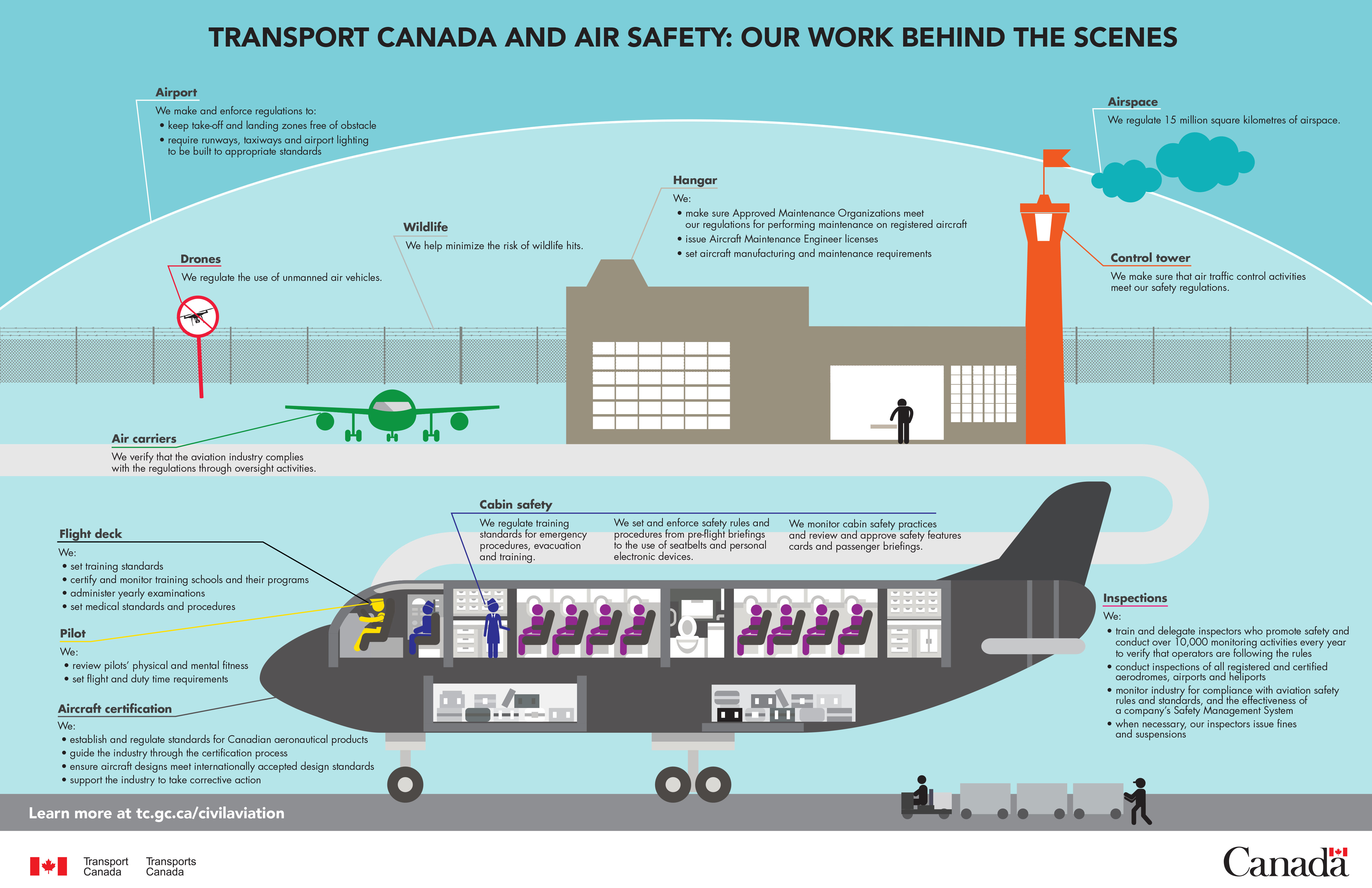Canada’s skies are busy. Millions of flights and more than 150 million passengers travel our 15 million square kilometres of airspace every year.
Transport Canada’s Aviation Safety Program
We work with industry and government partners to help keep planes, people and airports safe and secure. We develop and implement policies, regulations and administer the Canadian Aviation Regulations (CARs).
We set the standards for aircraft designed and used in Canada to ensure all meet certification requirements and operational airworthiness. We also oversee the licensing and training of pilots, crew members and aircraft maintenance engineers.
The work we do is not only applicable to commercial air carriers and those who work in the industry but also for other aircraft such as drones, hot air balloons, gliders and helicopters. Given there are over 34, 000 privately licensed pilots, recreational aviation is a big part of Canadian aviation.
In addition to our regulatory approach for improving safety, we also rely on promotional and educational tools to promote adherence to safety regulations and best practices within the aviation industry and to build awareness of safety hazards and risks.
As aviation is a global industry, connecting people, goods, and communities around the world, it is vital that our work extends outside of Canada so that people can have confidence in the safety of the aviation system around the world. Canada is working with international partners and key stakeholders to enhance the level of safety and security for commercial airlines travelling in or near conflict zones.
Our work behind the scenes
Aircraft airworthiness
Requirements and standards for aircraft and aeronautical product design, manufacturing and maintenance provide a framework for airplane manufacturers to integrate safety into their operations.
Aviation security
Aviation security is an important part of aviation safety. We regulate what items aren’t allowed on a flight, as well as screen cargo, passengers and airport personnel. When there is an incident, we work with the air operators to determine the contributing factors and mitigate the safety risks.
Aviation safety regulatory framework
We ensure a safe and secure aviation transportation system in Canada through laws, regulations, policies, standards, guidance, education, and oversight activities
General aviation safety
We are committed to improving general aviation safety based on best practices and lessons learned. Our partners and resources help inform the general aviation community how to fly safely. We also offer safety tips and information that is promoted in our Aviation Safety Letter.
Drone safety
Drone pilots must follow the Canadian Aviation Regulations (CARS) and learn the rules before they fly. That includes registering their drone and getting a drone pilot certificate.
Air-taxi safety
The air-taxi sector provides a wide range of air services to Canadians. Air taxis follow strict regulations while they move people or goods, often in remote environments with less infrastructure than seen at large airports.
Safety Management Systems (SMS)
These systems help air operators identify risks which creates an extra layer of protection to help save lives. We lead the world in having safety management systems in place and have defined how Canada exceeds State Safety Program (SSP) for Civil Aviation in Canada.
Aviation accidents and investigations
Canada has one of the safest air transportation systems in the world. We review all Transportation Safety Board of Canada recommendations with careful consideration and respond accordingly. These reports and pursuant recommendations help shape the future aviation safety framework in Canada.
International partnerships
Through work with International Civil Aviation Organization (ICAO) and other global stakeholders, we ensure aviation safety beyond Canada.
- International Civil Aviation Organization (ICAO)
- International agreements and arrangements
- Safer Skies Initiative
- Federal Aviation Authority (FAA)
- European Union Aviation Safety Agency
- UK Civil Aviation Authority
- Civil Aviation Safety Authority of Australia (CASA)
- Civil Aviation Authority of New Zealand

